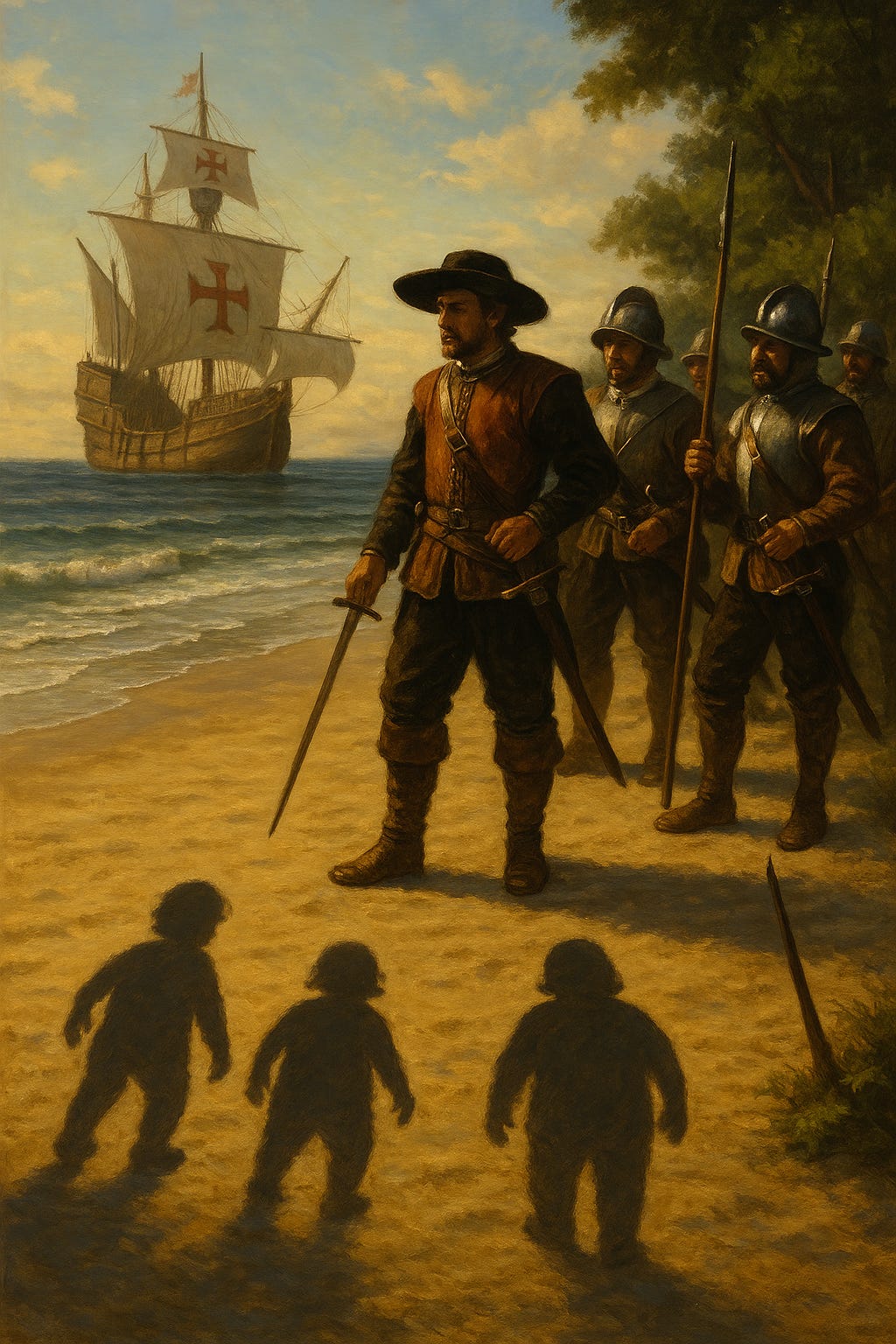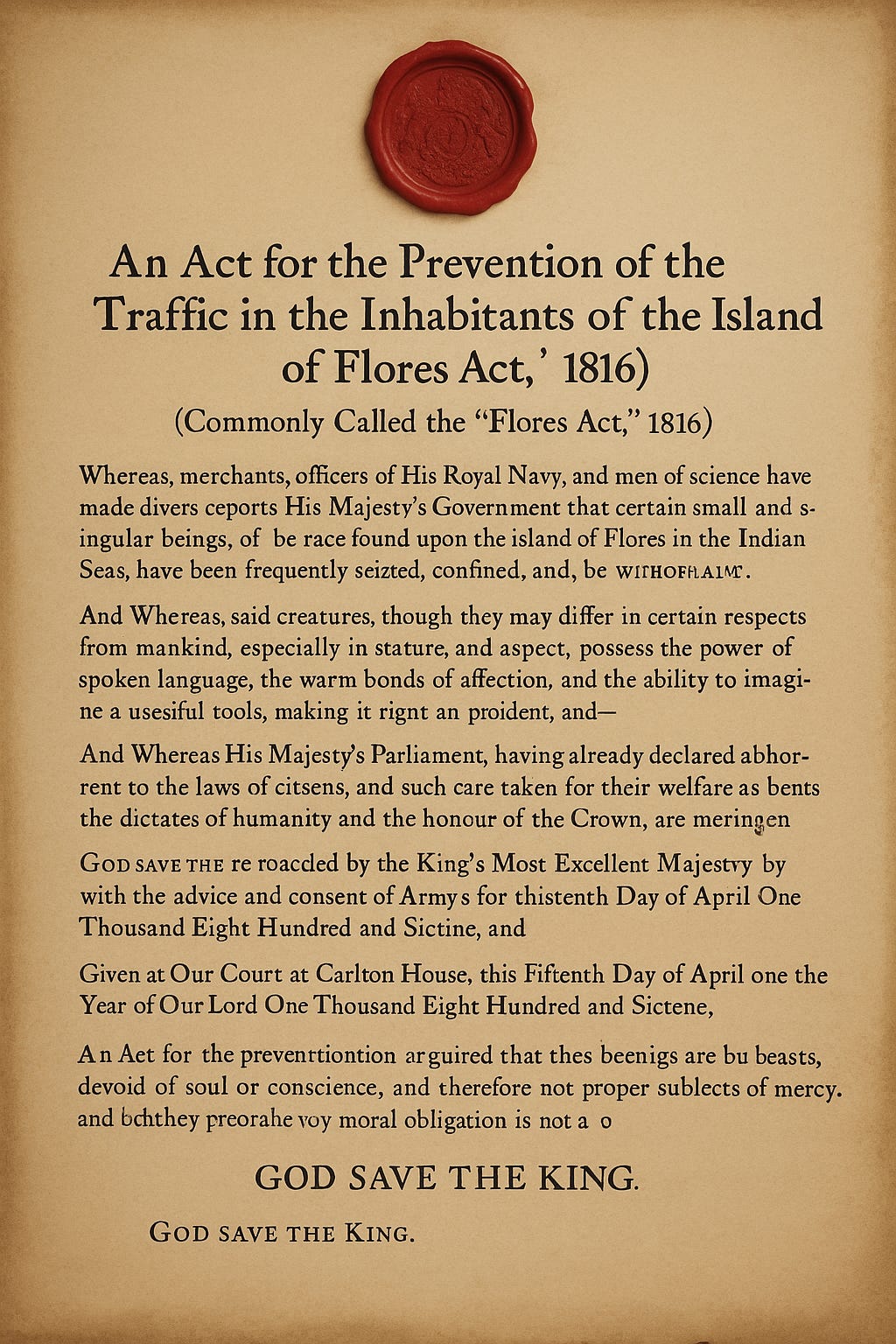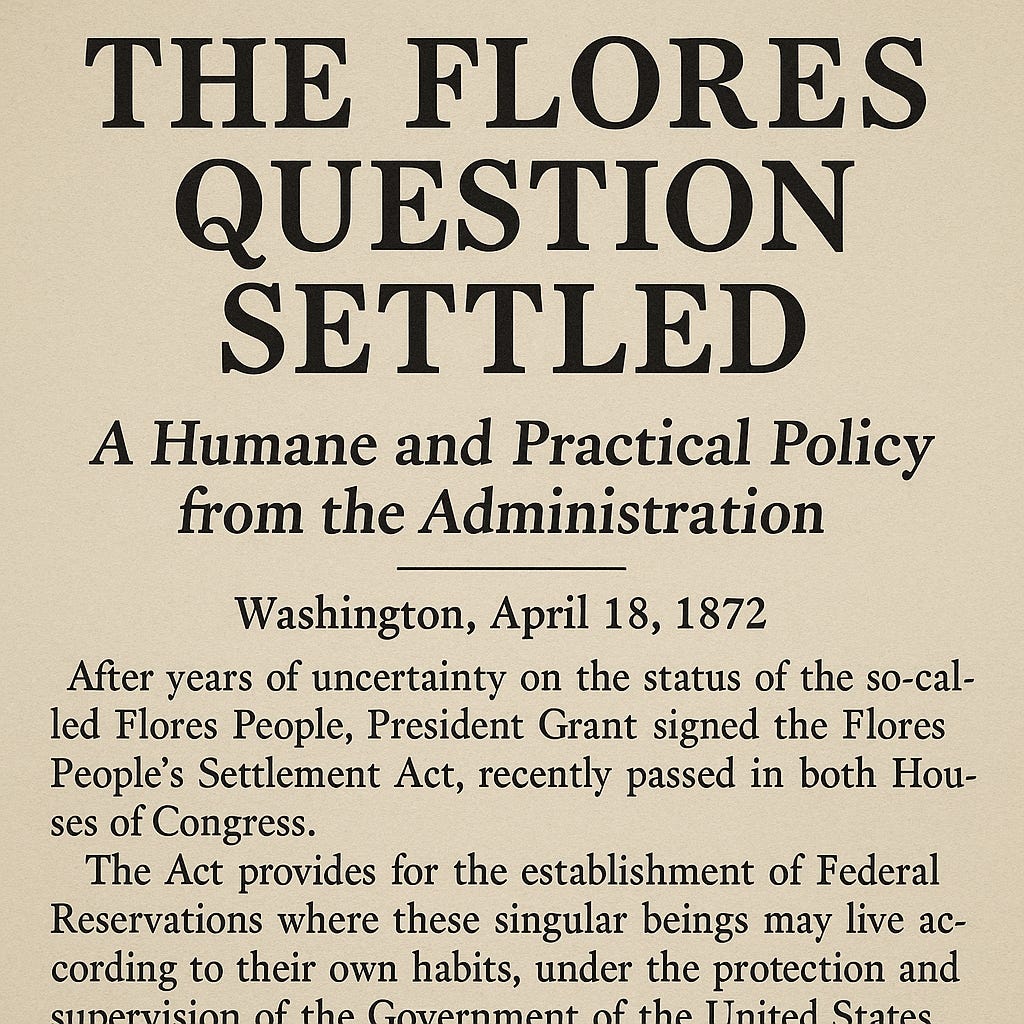How Would Humans Have Handled Hobbits?
The Primary Part of a Parable
I enjoy novels that imagine alternate histories. What if the South had won the American Civil War? What if Charles Lindbergh beat FDR in 1940? What if the Axis had beaten the Allies, a question at the heart of Philip K. Dick’s book, The Man in the High Castle, turned into a miniseries by Amazon.
I also sometimes wonder about historical what-ifs? What if Admiral Zheng He’s fleet had not been recalled? What if a storm had not hit the Spanish Armada? What if the Japanese had spotted the U.S. carriers before Midway?
Here’s another what-if I’ve mulled. In 2003, a team of archeologists discovered bones on the island of Flores in Indonesia. The bones were from a small member of the genus Homo, with a brain about the size of a chimpanzee’s but, intriguingly, there were stone tools nearby the find. Because this newly discovered species was diminutive, people began referring to them as the “Hobbits of Flores.”
They seem to have only recently, by evolutionary standards, disappeared. They survived until about 50,000 years ago, around the time modern humans appeared in the region.
What if they had survived to the present day?1
***
Ship’s Log, 23rd January 1522 (Translated from the Portuguese)2
By my hand, Fernão de Magalhães3
Noon latitude (by cross-staff): ~8° 30’ S
Reckoning: Westing through isles of the Sunda chain.
Wind & weather: The air is heavy with the recent passing of a monsoon. The sky is peppered with puffy clouds that portend no menace. The scent of land is once again welcome.
Sea & soundings: No swell to speak of, green water. Cast the lead in the shelter of a bight on the south coast—ten fathoms, I reckon. The sandy bottom is flecked with coral.
Landfall: At the third glass of the afternoon watch we lowered the longboat and stood into a narrow inlet guarded by black rock like broken teeth. Trees, weighted with ripening green fruits pressed us and vines hung menacingly all around. Birds called and alit in ample numbers. I came ashore with seven men armed. We bore beads of Venetian glass and a small mirror against the need to barter.
Footprints on the wet sand—small, bare, the toes splayed wide, the stride perhaps half that of a man. Beside them ash from a recent fire, with cracked shells and fish spines neatly piled, and a stone whose edge had been nursed keen.
From the shade stepped three creatures, like men but not like men, of a stature no higher than my hip—perhaps three cubits. They were as naked as Adam before the fall and I could discern them for two men and one woman by the plain tokens of nature. Their limbs were stout, heads somewhat large for their bodies, hair covering more parts than is natural. The larger male carried a little axe of stone hafted cunningly with gum and fiber, we would later observe.
I made open wide my hands and signaled the bos’n to lay down the beads. They seemed vexed, deciding between flight and approach, animated grunts, clicks, and gestures passing among them. The woman stepped up, paused as if to weigh the whole world, then took the mirror, and at her own face, stared, laughed, and touched her teeth as her eyes widened. I pointed to my breast: Fer-nã-o. The small male approached, passed a bead to its mouth, and bit as a merchant might bite coin.
It being clear they had no powers to comprehend our spoken language, I directed two of my men to the left and to the right with a mind to flank the party. The half-men seemed strangely oblivious to danger and in less time than it takes to heave a line, they were well secured in the longboat, shackled and subdued. I have dedicated a fortnight to tarry here that we might observe the doings of these creatures.
I have now circled half of creation and seen more wonders than any soul has right to see. In all my travels I have never seen a people so small in body. They act much as man but seem also feral, the way they did scream and thrash against capture. Sailors have said that the world was once peopled, only to be taken by the sea. Could these little folk have escaped notice of the greedy waters? And what do these small folk say of the Divine plan? If such creatures shape blades and kindle flame, what of the sacred boundary between beast and man?
I hereby name the island Flores in recognition of the beautiful plants that adorn its outermost edges and claim the island in full and in perpetuity for the crown of Spain, all glory to Charles V.
Report of 23 January, 1523 at the court of Charles V (Translated from the Spanish)
Address Before His Sacred Majesty Charles V, Emperor of the Romans and King of Spain and the Indies, Concerning the Newly Discovered Half-Men of Flores
By the favor of He who is most Divine and the diligent labor of your humble servants on the sea, I offer this report of the Pequeños Hombres or the Little Ones of Flores. Already well known is their short stature. Today I have the pleasure to relate to His Majesty the behavior of this newly found wonder.
They live in bands, no greater than two score, and by signs and grunts seem to make their meaning known one to another. They name the things of their world—a tree, a shell, a bird, a stone that cuts—and they contrive to hunt and to gather, though without any writing, numbering, or, it would seem, much remembrance beyond the present day. A friar of the Trinidad said of their speech that it was “as though language were struggling toward the light.”
Their fingers serve them for coarse work, but fine craft is beyond them. They can deftly break stones and sharpen bones, but there is no hope for them to weave. They can launch a stone for some distance and with some accuracy, but limited speed.
As far as observations permit us to determine, they lack law, know not sin, and respect only force. Conflicts are settled by might, often the large subduing the small, but occasionally the many subduing the few.
To all appearances, they live as the beasts do—by appetite, by might, by moment.
And yet, Sire, the are not completely lacking in wit. Fires are tended with diligence, and new flames are created should the need arise. They bring down the large (to them) pachyderms of the island, working together with serviceable projectiles and blades. They recognize themselves in a glass and seem to take delight in the experience. They can mimic sounds and gestures. All together, they seem much as untam’d children: discernment, yes, but without discipline or reason.
As to their place in the Divine plan, theologians and philosophers must needs decide. Are they imbued with a soul? Their casual cruelty and seeming lack of conscience weighs against, but their speech and craft gives one pause. Is Flores Eden, and the halflings what man was before the gift of God’s grace? Or are they a divine warning, what we become of stripped of His grace?
All glory to God and to Your Imperial Majesty.
An Act for the Prevention of the Traffic in the Inhabitants of the Island of Flores
(Commonly Called the “Flores Act,” 1816)
Whereas merchants, officers of His Royal Navy, and men of science have made divers reports His Majesty’s Government that certain small and singular beings, of the race found upon the island of Flores in the Indian Seas, have been frequently seized, confined, and carried off to be sold as curiosities and labourers at sundry ports of the British Empire;
And Whereas said creatures, though they may differ in certain respects from mankind, especially in stature and aspect, possess the power of spoken language, the warm bonds of affection and fellowship, and the ability to imagine and contrive useful tools, making it right and proper to deem them able to reason, understand, and, with little doubt, suffer;
And Whereas His Majesty’s Parliament, having already declared abhorrent to the laws of God and man the traffic in the persons of our fellow Men,4 cannot, without grievous inconsistency and scandal, permit the continuance of a trade founded upon like cruelty and avarice, exercised toward a species so like to our own;
Be it therefore enacted by the King’s Most Excellent Majesty, by and with the advice and consent of the Lords Spiritual and Temporal, and Commons in this present Parliament assembled,
That from and after the first day of January in the year of our Lord One Thousand Eight Hundred and Seventeen, it shall be unlawful for any subject of His Majesty, or any person resident within His Dominions, to capture, purchase, sell, barter, or in any way traffic in the inhabitants of Flores, whether by sea or land, upon pain of forfeiture of vessel and goods, and of imprisonment not less than five years and not exceeding fourteen years.
And Be It Further Enacted, That any of the said beings found aboard British vessels shall be forthwith liberated, and such care taken for their welfare as befits the dictates of humanity and the honour of the Crown.
And Whereas certain persons have argued that these beings are but beasts, devoid of soul or conscience, and therefore not proper subjects of mercy, His Majesty’s Government doth declare that the measure of moral obligation is not found in the perfection of reason, but in the capacity to suffer; and that no sentient creature capable of fear, hunger, and pain may justly be made a slave.
And Be It Remembered, That as Britain hath led the nations of the earth in suppressing the iniquitous commerce in human flesh, so shall she now extend her protection to these brethren of creation who, though they speak not our tongue, are yet fashioned by the same Hand and breathe the same air.
Given at Our Court at Carlton House, this Fifteenth Day of April in the Year of Our Lord One Thousand Eight Hundred and Sixteen, and in the Fifty-Sixth Year of Our Reign.
GOD SAVE THE KING.
Xavier Lyons, reporting for The New York Herald
THE FLORES QUESTION SETTLED
A Humane and Practical Policy from the Administration
Washington, April 18, 1872
After years of uncertainty on the status of the so-called Flores People, President Grant signed the Flores People’s Settlement Act, recently passed in both Houses of Congress. The Act provides for the establishment of Federal Reservations where these singular beings may live according to their own habits, under the protection and supervision of the Government of the United States.
The Little Men, as many in America call them, or Floresians, as certain philanthropists would have it, began to appear in significant numbers on the Pacific coast some twenty years ago, word having spread to their home of a new land with wide open spaces. First only seen in the wilder parts of California, Oregon, and the Territories, small groups are now routinely spotted around farms, settlements, and boomtowns where they can find food and shelter. Farmers and shopkeepers have been raising increasingly loud voices about stolen crops, slaughtered animals, and stolen goods.
While their numbers were small, few bristled at the federal protection from molestation that they enjoyed. As gangs of the little creatures began to extract heavier and heavier prices from their victims, the need for a new arrangement became increasingly urgent, not least because of the spreading of rumors of acts of cruelty being done to the little men.
Under the Flores Reservation Act, passed last week, three territories have been set apart—two in northern California and one in the Washington Territory—for the exclusive occupancy of these beings. Each reservation is to be enclosed by a substantial wall or fence to prevent the escape of the inhabitants and to secure the peace of the surrounding settlements. Within the walls, agents of the Bureau of Flores Affairs will provide food, clothing, and instruction “adapted to their peculiar capacities.” Additional reservations will be created as populations grow.
In a letter before the Senate Committee on Territories, Secretary of the Interior Columbus Delano wrote: “The Flores people, being of low intelligence and incapable of sustained labor, cannot safely mingle with our citizens. They are a race apart—neither beast nor man in the common understanding—and as such require guardianship. To allow them to perish by the rifle or the gin bottle would be a reproach to Christian civilization; to confine them humanely within their own precincts is both merciful and prudent.”
The Act was met with a mixed reception. Humanitarian societies in the East hailed it as a sign of progress and enlightenment. A few members of Congress, notably Representative Dawes of Massachusetts, have hinted that confinement “for their own good” bears a suspicious resemblance to the practices of less civilized nations, though he declined to clarify exactly which practices he had in mind. Several lawmakers bristled at yet another burden on the federal treasury with no offsetting financial revenues. “Why,” asked Senator Lee from Virginia, should the several states be paying for the troubles of but a few?”
The New York Times, July 9, 1917
WASHINGTON D.C.
War Department Organizes Flores Corps for Reconnaissance and Mines Work
NY Times Staff
The War Department has authorized the formation of several small units composed of the so-called Flores People for service in Europe, chiefly in reconnaissance, demolition of enemy obstacles, and mine- and wire-clearing in advance of infantry attacks. The units, styled in official documents as “Auxiliary Scouts (Flores),” will train under Engineer and Signal Corps officers at an undisclosed base before deploying to Europe.
A spokesman for the government emphasized that the measure springs from military necessity. “The Army employs the aptitudes of all its auxiliaries,” a senior officer stated. “These forces will save American lives. These units will be organized at the level of platoons or companies, no more than 100 individuals per detail, to ensure humane oversight,” as one memorandum phrases it.
The new policy has aroused some disquiet among lawmakers. The Flores people, long confined to reservations in the West, have never been admitted to the full rights of citizens, and their exact legal status remains the subject of debate. The proposal to send them into the hazards of a combat zone has occasioned concern that utility may outrun conscience.
At a hearing yesterday of the House Committee on Military Affairs, Representative Ellery of Massachusetts expressed the ambivalence felt by many: “No man in this chamber questions the necessity of winning this war,” he said, “but we must be vigilant lest we create a class of fighters whose lot is danger without dignity. If these beings are fit to bleed for the Republic, are they not fit to be shielded by its laws?”
Colonel M. H. Carr, speaking for the General Staff, declared: “The Flores Scouts are volunteers. We have consulted with linguists, psychologists, and even philosophers to ensure to the best that we are able that they are joining the fight with an understanding of the dangers and the stakes. They will be provisioned, clothed, and compensated with appropriate rewards at Army rates appropriate to their grade. They will be commanded by regular officers and they will receive the protection owed to all persons in the service of the United States.” When pressed whether “Army rates” meant the rates for laborers or active duty soldiers, the Colonel answered that, “their allowances are under review.”
Details regarding training were sparse, protected by military secrecy. Major McBride said that “they have shown that they can get into places our regular soldiers cannot and can avoid setting off actuators that a normal sized soldier would certainly activate.” He added that they could not reliably salute officers and often got distracted from tasks, but often performed “adequately.”
The Atlantic Rights Society for Everyone, an organization that has championed the cause of the Flores people, issued a statement arguing that “if these individuals share the responsibility to defend the Republic, surely they should have the rights guaranteed by the Republic.”
This little story is to be continued. In the meantime, ask yourself how the modern world should treat these little organisms. As pets? As people? Somewhere in the middle…?
I’ll provide some ideas about how different societies might treat them in the next (exciting) installment.
It might not be obvious how this ties to the ideas in this Substack. I ask your indulgence. The exercise is related to a topic frequently visited on Living Fossils, the nature of morality.
Full disclosure, yes, I leaned on GPT for this essay more than usual. So, no, I didn’t know how deep a fathom or how high a cubit was.
In this alternate history, the Philippines don’t go so hard for Magellan.
This is a reference to the Slave Trade Act and Slavery Abolition Act, which I take to have occurred in my imagined timeline.





Thanks for writing this, it gives a lot to think about. I’m so intrigued by the Flores Hobbits idea, it really makes you wonder about alternate timelines. I'm curious how you see Magellans log entry fitting into the 'what if they survived' narrative. Is it the start of an encounter scenario?
Nihil novum sub sole, "Spanish Black Legend".